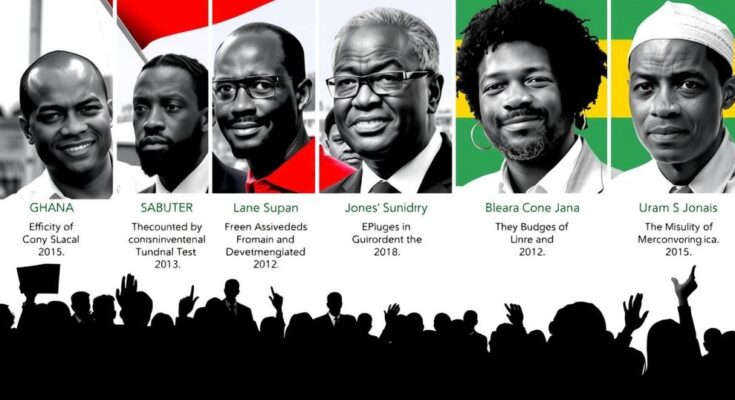On December 7, 2024, Ghana will conduct its presidential and parliamentary elections, with Mahamudu Bawumia (NPP) and John Mahama (NDC) as the main candidates. Economic issues, including high inflation and poverty, dominate voter concerns. The upcoming elections will culminate in either a direct win or a runoff if necessary, continuing Ghana’s tradition of close electoral contests.
Ghana is set to hold its general elections on December 7, 2024, giving nearly 18.8 million registered voters the opportunity to choose a new president and parliament. The primary contenders for the presidential race are Mahamudu Bawumia from the New Patriotic Party (NPP) and John Mahama of the National Democratic Congress (NDC). This election marks a significant moment as Nana Akufo-Addo, who has served two terms since 2016, prepares to step down. In addition to the presidential vote, there will be elections for Members of Parliament across 275 constituencies.
Although 12 individuals are competing for the presidency, Bawumia and Mahama are the two frontrunners. Bawumia, 61, having served as vice president, aims to become Ghana’s first Muslim president but faces challenges due to criticism over the economic crisis during his tenure. Meanwhile, Mahama, 65, seeks to make a political comeback after previously losing in the 2016 election and has criticized the current state of the economy, promising a transformational agenda.
Other candidates include Nana Kwame Bediako, a businessman with strong social media presence, and former NPP minister Alan Kyerematen, who departed from the NPP amid allegations of bias in the primaries. Economic issues, particularly rising living costs and a surge in inflation which peaked at 54% in late 2022, have become pivotal topics of concern among voters. It has been reported that about 850,000 individuals fell into poverty last year due to these economic challenges.
Both major parties acknowledge the necessity to address the environmental impact stemming from illegal gold mining (referred to as “galamsey”), which has sparked public outcry due to pollution of major rivers. The NDC advocates for stricter regulations, while the NPP seeks to maintain allowances for small-scale mining.
The presidential election requires a candidate to secure over half of the votes to win outright; if no candidate achieves this, a runoff will ensue between the top two candidates later in December. Voters will have their fingerprints checked and receive two ballots on election day. Past elections reflect Ghana’s tradition of close and peaceful contests, with the electoral commission expected to announce results by December 10.
The upcoming elections in Ghana represent a critical juncture in the country’s democratic process, expected to occur on December 7, 2024. As the nation prepares to elect a new president following Nana Akufo-Addo’s tenure, attention is drawn to the two principal candidates, Mahamudu Bawumia and John Mahama, both of whom bring distinct backgrounds and strategies to the race. Key issues influencing voter sentiment include economic conditions, social policies, and environmental concerns, which have been exacerbated by recent challenges faced by the nation, including a high inflation rate and unemployment among youth.
In summary, Ghana’s upcoming elections in December will not only usher in a new president but also reflect the citizens’ response to pressing economic challenges and governance issues. With a backdrop of a turbulent economic climate, the electorate is faced with choosing between the familiar leadership of Mahama and the innovative potential of Bawumia. The civil execution of the electoral process and historical precedent of peaceful transitions underscore the significance of this democratic exercise for the nation’s future.
Original Source: www.bbc.co.uk




